This is a love story.
It’s not the usual one. Or one that many of its participants ever imagined they would be involved in. It’s about unconditional motherly love. And boy, is it fierce.
You may unsubscribe from any of our newsletters at any time.
These are mothers who have been told — often by faith leaders and religious communities — to abandon children on the LGBTQ2 spectrum. Their kids are gay or lesbian or bisexual or pansexual or trans or two-spirit or intersex or queer or, in some other way, not cisgender or heterosexual. But the mothers adamantly refuse to shun them.
Instead, they are mustering by the thousands, secretly, invisibly, from all over Canada and the United States, linked on private online sites. They are repudiating those who tell them to cut ties with their kids and are joyfully standing in for parents who have done the unthinkable and shunned their own flesh and blood.
Hundreds join this underground virtual network each week. Refugees from conservative religions flock to sites with names like Mama Bears, Mama Dragons, Free Mom Hugs, Serendipitydodah for Moms and FreedHearts. This is not so much a trend as a movement, raw with momentum.
“When your child comes out, especially if you are in a religion or an organization that is against LGBTQ2 people in the community, it’s very isolating. It’s very lonely,” says Dana Burgess, 55, who attended a Mormon church near Calgary until her daughter came out. “In this day and age, the first thing you do is go online and look for others with the same experience. It is amazing how people you never meet … become such an integral part of your life.”
For all its ferocity, this is not an easy love story. The fact that it exists at all is a product of hatred. Faith leaders and family have told some of these mothers that their children are abominations who will burn in hell. Others hear that their children should be put to death along with anybody who supports them. Susan Cottrell, 60, of Austin, Tex., has been called “Satan’s daughter” for, among other things, founding the non-profit FreedHearts in 2013 along with her husband, Robert.
Despite backlash, the movement is finding its public voice. Since starting their organization, Cottrell and her husband have become prominent among parents of faith who are firmly standing beside their LGBTQ2 kids. The TEDx talk Cottrell gave in January about her decision to choose her kids over her church has more than 750,000 views on YouTube. “It’s an idea whose time has come,” she says. “The rejection has gone under the radar for so long. People aren’t going to have it any more.”
Cottrell and many of these moms are reclaiming the Bible as a guidebook of love and acceptance, rather than a screed of hatred and rejection. They are either challenging their faith institutions to wake up or are ditching them as irrelevant. As they do so, they are charting a new path for their own faith, and, maybe, the future church. And, of course, this love is turning them into remorseless campaigners for human rights. “We look all soft and cuddly and lovely,” says Calgary’s Burgess. “But just try and do anything or say anything that negatively affects our cubs and we fight back.”
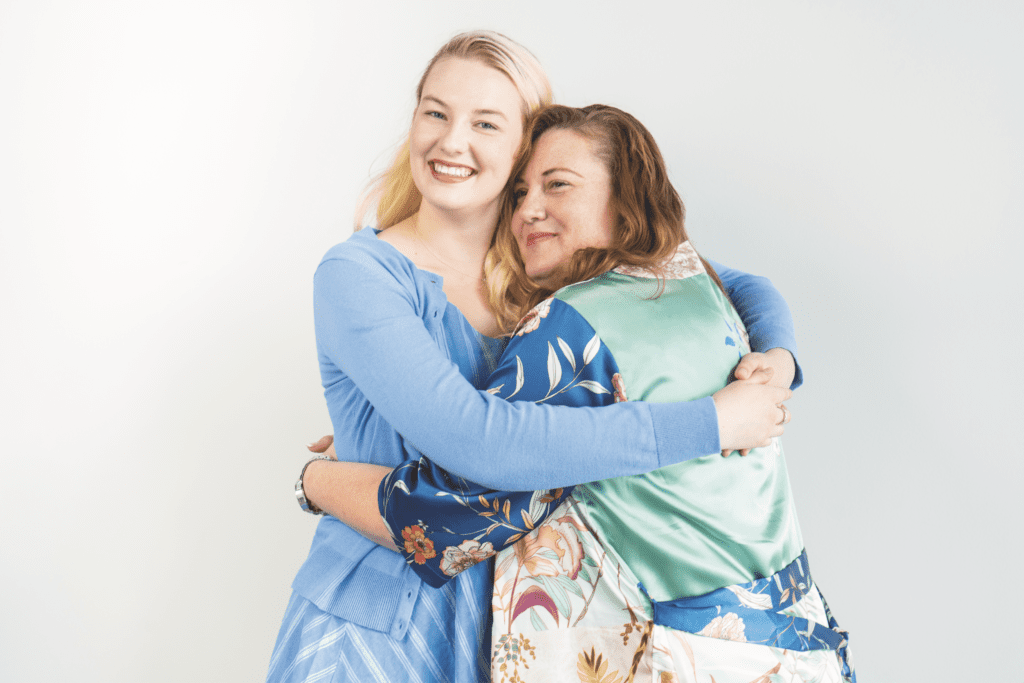
A confession. When I started researching this article, I was having a tough time understanding the scope of the prejudice — or its rationale. In Canada, it’s been explicitly illegal since 1995 to discriminate based on sexual orientation. We’ve had openly gay members of Parliament since 2001. Same-sex marriage has been legal since 2005. As for church, I’m a member of the United Church, the biggest Protestant denomination in Canada, and we opted to ordain gay ministers more than three decades ago. In 2010, we ordained the first openly transgender minister, Rev. Cindy Bourgeois, and in 2012, elected Very Rev. Gary Paterson as moderator, making him the world’s first openly gay leader of a mainstream Christian denomination. As well, many congregations explicitly choose to affirm the LGBTQ2 community.
Sure, I could see that some churches in the United States were still opposing gay rights. In February, after an impassioned debate, the United Methodist Church, with seven million adherents in the United States alone, rejected a plan to ordain LGBTQ2 clergy or perform same-sex marriage. And in April, the Mormon church (Church of Jesus Christ of Latter-day Saints) withdrew its 2015 ruling that same-sex couples were apostates and that their children could not be baptized, only to reaffirm its position that same-sex marriage is a serious transgression.
But in Canada? I wasn’t even sure that the Mama Bear movement was needed here. So I asked Cottrell to put the word out that I wanted to chat with Canadian Mamas. And they started getting in touch — a whole bunch of them. They told me prejudice against their kids still runs deep, despite the progress. It is structural, institutional and very, very personal. And because the world is so digitally connected, even the most virulent bigotry, no matter where it comes from, is finding its way into Canadian homes.
Burgess was one of the Canadian Mamas who contacted me. About two years ago, her daughter Brynn, now 26, came out as gay. At that time, Burgess and her husband, Alfred, 56, along with their four children, worshipped at the Mormon church. Their pastor told her that if she cared about Brynn’s spiritual well-being, she would remove Brynn from her life and hope that her daughter would “come to her senses.” People in the church community said her child was a “mistake” who would never have love in her life or have children who would be accepted by the church.
Burgess was outraged. “I said, ‘My daughter will always be welcome in my home. Her partner will always be welcome in my home, just as my other children’s partners are. I cannot choose anything over my child.’”
This situation isn’t limited to the church Burgess attended. She points to some independent Christian schools in Alberta that have taken the provincial government to court to stop new measures aimed at supporting LGBTQ2 rights in schools. “Churches, whether people want to admit it or not, are a powerful force in our societies,” she says. “If every church in our society would turn around and become totally accepting, totally open, totally affirming, I think we would see a change.”
More on Broadview: 3 transgender Canadians share the journeys that shaped their faith
When I FaceTime with Jessica Mélançon, 38, she has just finished a two-hour journey in Montreal to pick up her son Nemis, 10, from school. I see her settling down on the side of a bed. Nemis pokes his head in a few times. He wants to make potatoes, but he’s been naughty and Mélançon wants him to apologize. He finally does. They hug. He leans in to say hello to me and then sprints off to the kitchen, like a slender wisp of light.
Nemis is a drag queen who performs under the stage name Lactatia, frequently rocking heavy eye makeup, a wig, heels and serious sparkle. “It was very obvious at a very young age that our son was going to be this fabulous human being,” says Mélançon, adding: “Halloween gets to be every day.”
Two summers ago, Nemis’s fame in the drag arts went viral. Teen Vogue came calling, and so did Elle and CBC Arts. He flew to New York. And then the online hatred began from what Mélançon and her husband, Cory Golden, 32, call “far-right Christian extremists.”
“It gets really intense. I feel like the far-right Christian conservatives have a weird obsession with the gays,” she says. One Christian online media site even suggested Mélançon’s family was the cause of a hurricane. “The wrath of Christ was manifesting. We were bringing on the coming of the end times because,” she pauses, laughing, “we have a queer kid who engages in queer activity. It’s crazy.”
She has severed ties with some friends and family who think her support of Nemis is wrong. But a lot of the reaction in their community has been positive, including at his school, where, she says, people have always known Nemis to be an “over-the-top, extra kid.”
Sometimes, passersby give them weird looks, but it never lasts long. She and her husband are imposing people. Golden sports a bushy beard and is heavily pierced. Mélançon stands six-feet tall and is covered in tattoos from the neck down. “I take up a lot of presence. I come from a long line of Amazonian women,” she says. “I’m the nicest person. But at the end of the day, I’m not open to have somebody project their hate on me.”
All too often, the hate is expressed in religious language. It baffles Mélançon. Golden is Jewish. Mélançon’s grandfather was a Lutheran minister. Some of her happiest memories are church-related. “Maybe that’s what I will learn on this journey, the understanding of where all that hatred comes from,” she says, as we end our conversation. “I’d really love to find out what happened to make people feel that hateful in the name of God.”
“My God loves everyone. There is no one to whom God says, ‘You don’t belong here. You’re wrong.’ If my God allowed this creation to happen, then it is right to happen in my God’s eyes.”
Lisa Renaud
Liz Dyer, 62, still remembers when she thought being in a gay relationship was a sin. It was what she was taught growing up in the Southern Baptist evangelical tradition. A pillar of the church, she led women’s ministry and Bible studies. When her son, Nicholas, now 31, came out a dozen years ago, he challenged her to point to anything in the Bible that said it was wrong to be in a loving gay relationship. She looked, certain it would be there. It wasn’t.
“There’s nothing that talks about him dating someone of the same sex, getting to know them, building a relationship with them, falling in love, getting married, having a family,” she tells me, sitting in her car in Dallas-Fort Worth, Tex., during her lunch break from her day job. She adds: “I came to the conclusion that it would be a sin for me not to affirm same-sex relationships.”
Dyer and her husband have since stepped away from their church. “Very early on in this journey, we realized the churches we were involved in were not a safe place for us to go on this journey and explore and ask questions,” she says. “I had a lot of anger. I felt that I had been duped and even betrayed by the church in many ways.”
FreedHearts founder Cottrell has a more pointed analysis. When her daughter came out a few years ago, she and her husband discovered that their evangelical church no longer had a place for them, despite 20 years of devoted involvement. That launched Cottrell on an examination of her faith that led her straight to the seminary. She is now an ordained minister.
“That’s just not the way to respond to a human being,” she says. “If this is who she is, how can it be a sin? And are you summarily dismissing my daughter, and me and my husband if we accept her? Is that what your life in Christianity has taught you to do?”
Even if her evangelical church believed that being gay was a sin, the penalty is way out of proportion to how it punishes other sins, she says. The church was telling families to shun kids who are as young as 12 and who may never even have kissed anyone. “What was really going on?” she wondered.
Today, after years of study, she believes it comes down to power and money. The evangelical church needed a scapegoat in order to catapult itself into politics. It found the gay community. “A good enemy raises a lot of money,” she says.
She learned that the theology of the exclusion of gays relies on just six of the Bible’s 32,000 verses. (Some of the Mama Bears call these the “clobber verses.”) By contrast, hundreds of verses tell adherents to take care of the poor, but that may require personal action. Dismissing the LGBTQ2 community only requires attitude. “It doesn’t make sense if you look from a moral perspective,” she says. “But it makes sense if you look for money and power and control. Then it makes all the sense in the world.”
For Cottrell, the Mama Bears movement is like an online church. “We believe pews and pulpits are full of people just waiting for permission to be fully inclusive,” Cottrell says. She and her husband, Robert, would like to see more dads get involved, too. Currently, there are a few hundred fathers in FreedHearts support groups, compared to thousands of mothers.
“Especially for those dads in the evangelical church, we are taught and trained that [being LGBTQ2] is a choice that can be fixed,” Robert says. “But many dads know in their hearts that this is not true.”
For her part, Dyer founded Serendipitydodah for Moms, an online space for LGBTQ2 people and their friends and family who are “attempting to develop and maintain healthy, loving, authentic relationships.” The group now boasts more than 5,000 members on its private Facebook page, an online home of the Mama Bears. “This is my ministry,” Dyer says.
Another prominent figure in the Mama Bears movement is Sara Cunningham, 55, of Oklahoma City. She is the executive director of FreeMomHugs.org and stands in at gay weddings when the biological parent refuses to attend. When we chat via Skype, she has just finished sending out dozens of Pride Parade start-up kits to new group leaders. At times, her organization receives 50 emails an hour from people around the world wanting to get involved.
“It really is a holy movement,” says Cunningham, whose son Parker, 28, is gay. Her white-blonde hair is styled in a sharp pixie cut. Her lipstick is blood-red; her eyes ablaze.
“What’s at stake?” I ask her.
“My accountability. I’m accountable to what I know and what I believe with everything in me. I think nothing else matters. I’m accountable to God. I’m accountable to my child. I’m accountable to you.” She pauses and grins. “Whew. I gave myself a hot flash!”
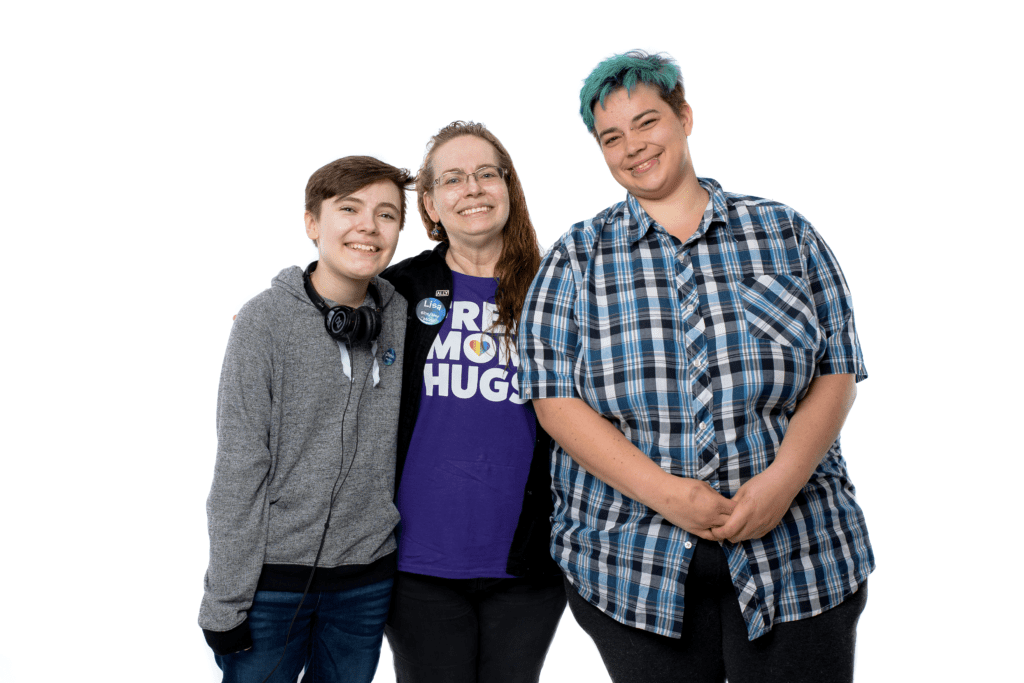
Passionate love demands action. It may mean abandoning doctrine and finding faith. Or it may mean trying to shape an institution from within. Missy Weening, 45, her husband, Chris, 45, and their lesbian daughter, Olivia, 18, have been working with their Christian Reformed church in Calgary to discuss its stance on gay issues. Weening is not sure she can stay in a church that won’t allow their daughter to be married in its sanctuary, but she says she has rediscovered her own faith in the process.
“In a perfect world, as a Christian, I would like the church to say, ‘We have been interpreting this wrong for years, and we are sorry.’ And I would like even the evangelical Christians to have a change of heart. That would be a dream come true,” she says.
Until that dream becomes a reality, many Mama Bears offer LGBTQ2 kids surrogate love and acceptance that they aren’t getting from their communities. Mélançon of Montreal, for example, offers support to kids who have been evicted from their own homes or foster homes, some as young as 13. That includes providing “free mom hugs” and listening to heartbreaking stories. She hopes it makes up for some of the trauma. If she won the lottery, she would set up a shelter for all the abandoned LGBTQ2 kids out there and give it the puckish name “Queerdo Hotel.”
“I feel like the Mama Bears as a whole, we’re so needed in the world right now,” she says. “I cannot for the life of me understand how parents can completely shun and abandon their children because they might be gay or they might be trans or they might be non-binary or they might just identify as something that isn’t completely heterosexual.”
That’s exactly what happened to Arwinn Cross, who was living with his grandmother, a Jehovah’s Witness, in Windsor, Ont. In March 2018, he came out as trans, and his grandmother gave him 24 hours to get out of her home, saying he was an “inconvenience.” He was devastated. And, like more than 10,000 other LGBTQ2 youth in Canada, the 21-year-old is homeless.
Thankfully, Cross has found Lisa Renaud, 51, a local Mama Bear whose 13-year-old is trans. The two met through the community centre Windsor-Essex Transgender and Allied Support where Renaud volunteers at least once a week. It features a drop-in, food bank, clothing, counselling and support groups. “She’s always trying to help out any way she can,” Cross says. “I feel like I’m actually cared for.”
Renaud was raised Episcopalian, had a stint in the Baptist church and was baptized Mormon as an adult. She does not attend church services now but asserts: “My God loves everyone.” There is no one to whom God says, “‘You don’t belong here. You’re wrong.’ If my God allowed this creation to happen, then it is right to happen in my God’s eyes,” she says, her voice rising with passion. “I do not feel like my faith has been challenged or tested.”
“I feel like the Mama Bears as a whole, we’re so needed in the world right now. I cannot for the life of me understand how parents can completely shun and abandon their children.”
Jessica Mélançon
Thérèse Plourde, 47, of Lévis, Que., was raised Catholic and has also attended Protestant churches. When she realized that her 22-year-old gay son is going to have a harder life than her daughter who isn’t gay, it was like a hammer blow. “Something woke up in me,” she says. “There was this fire, this dragon fire growing in me.”
Today, she spends up to five hours a day as an online crusader, educating trolls about gay rights and reporting hate speech. She has rejected any affiliation with a church, finding hypocrisy in institutions that teach love and acceptance but don’t practise them.
“I would say I feel closer to Christ than I have ever felt before,” she says. “My faith has been heightened by the experience, but my religion has been diminished.”
The day before I spoke with her, she’d received a death threat, one of many. And not just against her, but against anyone who is homosexual or those who “give hearty approval of its practice.” It’s why she spends so much of her time turning her love into activism. Like the other Mama Bears, she is a prophet, showing the rest of us how much is left to be done.

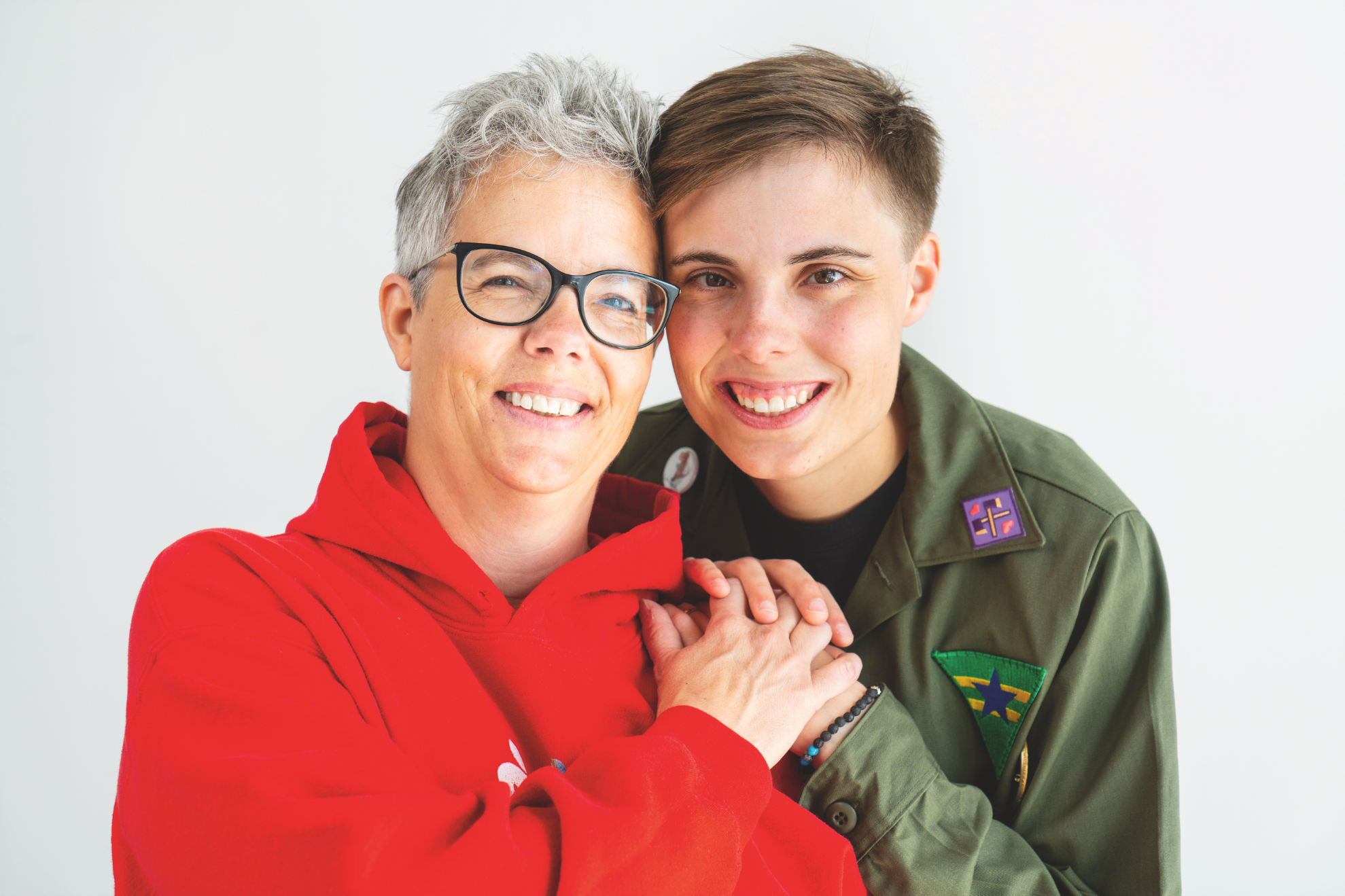







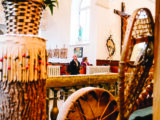
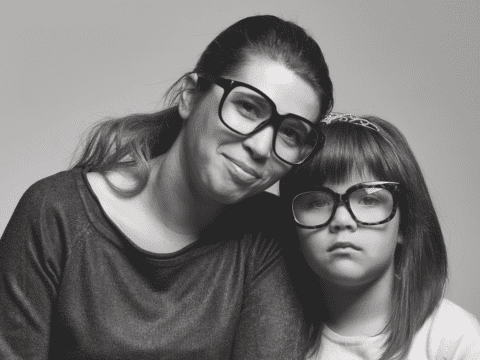
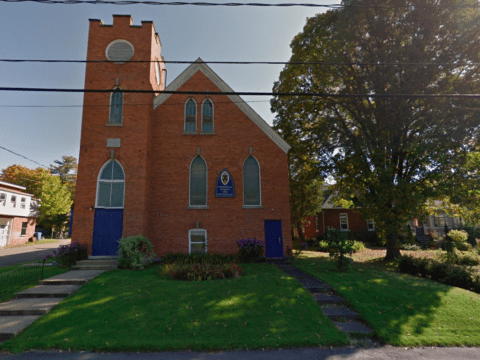
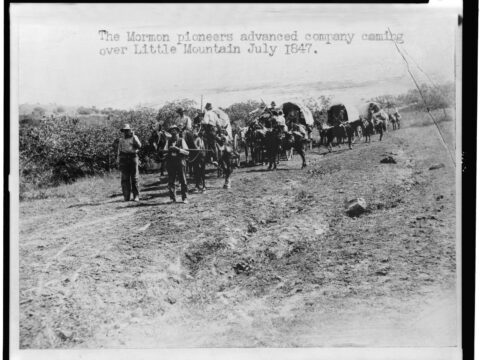
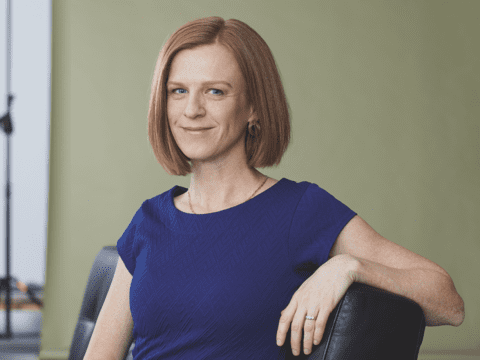
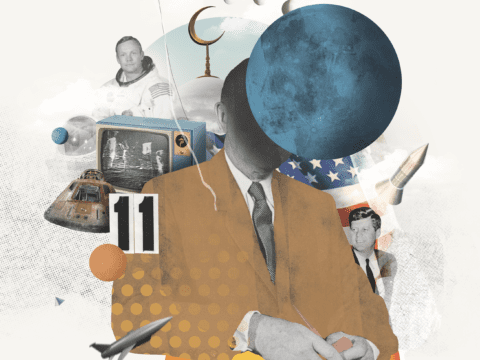
I think there are so many who stay and fight within the church because they’ve seen that the church’s stance has hurt–and even caused the death–of many. How can you walk away from that and let it continue? In my small conservative town alone, 2 gay teens have committed suicide when their churches forced their parents to choose–and the parents kicked their kids out. One was 15; one was 20. I will fight any institution that does this.
And, by the way, there is no “gay agenda”, other than wanting to live a normal life. Human rights are not a pie–you don’t get less because other people get their share.
People who want human rights are “downright evil” like those who want to strip them of their rights? What? How?
No one is forcing anyone to love anyone. Gay rights is about equal rights and not discriminating against LGBTQ+ persons. You don’t have to love anyone – just don’t work to strip them of their rights or dignity. After all, they are not the ones obsessing over what you do in the bedroom. If you care about the sex lives of others so much, that makes you the pervert.
And if a church would diminish a person for their inborn nature that hurts no one, that church is evil. If their scriptures allow it, then their scriptures are evil. We need to say this. To be silent is to allow the abuse to continue.